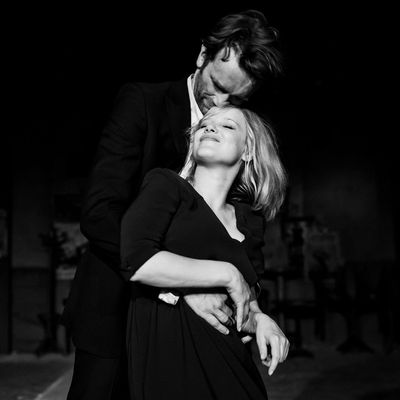
This review originally ran during the Cannes Film Festival.
Like nearly any Broadway musical you can think of, Cold War is a love story told through love songs. They start off early in the film, sung by peasants in rural postwar Poland, plaintive, heart-piercing melodies about impossible loves. Whether the voices spring from the careworn faces of graying men or unnervingly solemn children, you get the sense that the singers have weathered far more objectively traumatic experiences, and yet, the perennial idea of romantic heartbreak is still where all their pathos is poured.
Wiktor (Tomasz Kot) is leading a crew documenting this music, and has dreams of elevating it to high art. Like a less cynical, Eastern-bloc Simon Cowell, he summons the untapped local talent to audition for a choral ensemble, which is where he meets Zula (Joanna Kulig). With her transcendently earthy voice, she performs a Russian musical number with ebullient bravado. “Thank you, heart,” she sings, arms outstretched, “for knowing how to love like this.” His colleagues have dug up the dirt on her, she’s not a mountain girl at all, and even more intriguingly, she’s on parole after murdering her father. “He mistook me for my mother, so I showed him the difference with a knife,” she explains matter-of-factly. Wiktor falls irretrievably. Soon, Zula follows him.
Pawel Pawlikowski’s film, based loosely on his own parents’ story, traverses the Iron Curtain and plays out in the shadow of hardship that would threaten to render a little old love story inconsequential by comparison. But it’s in constant dialogue with that backdrop, evolving with every location change and time jump. The music that its leads love brings them together, divides them, and evolves with them, telling a complementary story of how fatalistic or hopeful the characters, and by extension, their milieu, believe love can be. Shot in shimmering black and white in striking 4:3 aspect ratio (as with his last feature, 2013’s Oscar-winning Ida), it’s visually stunning, passionate, wistful, and thoughtful in equal measure.
No sooner does Wiktor mount the chorus’s first show — with Zula as its star — than the Soviet government takes interest, seeing it as a perfect propaganda mouthpiece. Wiktor and his producing partner Irena (Agata Kulesza) grit their teeth as the ensemble sings a glorious ode to Stalin in front of an enormous banner of his face, and when the government funds a tour that takes them to Berlin, Wiktor plans his escape with Zula. But she never meets him at their planned rendezvous, and he crosses the border alone, seemingly traveling through time into to the bright lights of West Berlin.
Thus begins a decade of falling apart and coming back together between Zula and Wiktor, in Paris, in Yugoslavia, and back to Poland again. Wiktor works as a musician and composer in Paris, soaking up the creativity and loose mores of the jazz scene, but when Zula arrives, she chafes against the bourgeois conviviality. Pawlikowski lets the music — their language, their genre, how they’re sung — suggest how incurably ill-suited Wiktor and Zula are to be together in the same place at the same time. They cut a record together, with Zula changing her style to fit the breathily au courant French jazz style, but it’s anemic compared to the inimitable richness we know she is capable of. She scoffs at the metaphors Wiktor’s poet girlfriend writes for her to sing (she has since picked up a husband in Italy; they are both each other’s eternal side pieces). The naked sincerity of the songs of her homeland are what really light her up.
Kulig, a Polish stage and TV veteran who starred opposite Ethan Hawke in Pawlikowski’s 2011 film Woman in the Fifth, is astounding here. She nearly a dead ringer for Jennifer Lawrence, and yet you would never confuse the two; there’s something lethal in her presence even before we find out that Zula has a rap sheet. She does everything with a kind of tortured fury, whether she’s dressed in traditional Polish garb and singing with the chorus, or throwing back drinks and dancing on the bar at a jazz club in Paris. Kot is also strong but more subdued, and there’s something more intellectualized about Wiktor’s passion, whereas Zula’s feels elemental and volatile.
There’s something darkly ironic about where they eventually end up together, and their final destination feels a little unmotivated. If anything, Cold War (which comes in at a lean 84 minutes) could do with some more time with each of them on their own, just so that each reunion feels a little more hard-won. But Cold War is itself a kind of love song itself, and their volatile togetherness is the hook, the only thing that really matters. Pawlikowski understands the mythic, destructive pull such narratives have on us — as audience members and those swept up ourselves.
Cold War was nominated for three Oscars in 2019, including Best Director, Best Cinematography, and Best Foreign Language Film.

